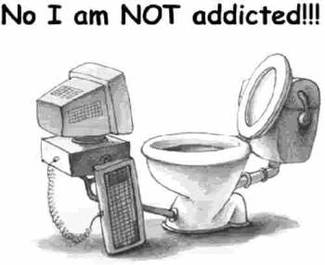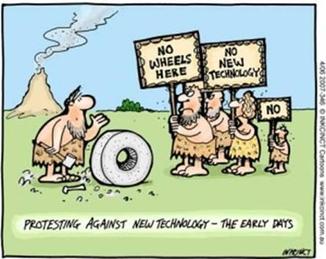PROMPT:Read and/or watch the videos in the articles and video post for the research post. Use the following questions to help you write a blog post on your chosen topic. You don’t need to answer the questions in order. Use them as guide to what I would like you to cover in your post.
| MY THOUGHTS:I've just finished reading the articles and watching the video about the technology addiction, and before I begin my response I want to stress how much I agree with the email mogul from the video who said, "Technology is a tool. It can't be good or evil. Is a hammer good or evil? It's good if you use it to build a house and bad if you use it to hit someone over the head with it. It's a copout to say technology is good or evil." I love this quote. It's a similar theme to what I talked about in the blog post about barriers to achieving technology integration. It's very difficult to make a sweeping declaration about all technology, because the context in which it's used has such a massive effect on the entire experience. By the same token, it's hard to talk about "technology addiction" as one concept. Just like all the issues and problems we face each day, an addiction to technology manifests itself differently in each person. I definitely rely on my phone and my computer to do a lot of tasks for which my parents never needed them. I definitely enjoy using technology, and enjoy helping others find the best fit for it in their lives. But am I addicted to technology? I don't know if either of those words are specific enough. Having said that, is it possible to rely on modern technological conveniences to an unhealthy amount? Yeah. (See, nobody told you this was going to be easy.) While Internet browsing has its benefits, there are times when I really should be doing something else. I need to do homework, I need to exercise, I need to clean my room. One might call this procrastination. There are times when I'm just itching to see what that notification says. One might call that a desire to learn. Even when I prefer to talk to someone online rather than over the phone, that might just be bad habits. All these together start to give off the impression of an addiction. I guess I am "addicted" then. This is obviously not as serious a case of "addiction" as getting a leg amputated due to inactivity, but it's still "addiction"; it's still a vicious cycle of stimuli, compulsions, and all that mishegoss. I guess if I had to take a step back and really look at how I pay attention, one might argue that technology has lowered my attention span. I would agree with one of the articles, in which the author writes how the ability to pay attention to something relevant or interesting has gone unchanged. This goes back to the four components of the Procrastination Equation. I see applications here for Expectancy and Value easily. Impulsiveness and Delay are a little trickier to apply.
Clearly, when I'm interested in something, there's no shortage in attention, interaction, and participation (You may or may not have noticed this in IDC). It's when I'm not interested that suddenly my acclimatized "Tech savvy mind" starts expecting a break, a distraction, or some alternative. I can understand why. Difficult or boring homework at home is broken into small chunks to make it more manageable (These pictures aren't just for you, you know). I even watched the video about Tech Addiction and Multitasking with my laptop in hand, walking around the room, making dinner, eating dinner... I could go on. Let me be clear. I am not a multitasker. I don't like to do it, and when given the chance I like to put as much attention into one thing as I can. Nevertheless, I am a procrastinator and a short-attention-span-studier, so sometimes I resort to these tactics. Really, it's whatever works. I probably work like this because of the amount of technology I am used to interacting with on a daily basis. It seems like the instant gratification of the Internet teaches your brain to expect the same instant reward everywhere.But don't take away my computer yet! It's not the only possibility. To be honest, I'm still not completely sold on the idea. I admit these three concepts exist. People of all ages admit to technology addictions, shorter attention spans, and digital distractions. My friends and I will get together at someone's house, pull out our phones and text or facebook one another instead of talking face to face. With new technology in the classroom, it's always easy to be distracted by the flashiness without getting to the content. There's no doubt that our minds are being rewired by the technology we use. The question that needs to be answered (objectively) is whether this really is a problem or a just sign of changing times. WAIT. BARE WITH ME. I don't mean to sound like the typical teenager. I just can't help it. What if this is way the world is going to work from now on? What if humanity is just adapting to the needs of the fast-paced Information age? Our earliest fish-like ancestors may have needed gills because they spent all their time in the water. We no longer have gills, because (while we still swim) we spend the majority of our time on land. What if there comes a time when a longer attention span is no longer needed? While we'll always have moments that require deep thought, what if technology is welcoming in an age in which a longer attention span is not needed all the time? Either way, we shouldn't be trying to protect students from the adverse effects of technology integration, but rather provide them with the tools they need to find their own balance. Assignments like this one help students get informed on the issues, while allowing them to make their own choices. A teacher who forbids laptops in his/her class helps a student for a semester. A teacher who helps the student understand what's really at stake helps the student for a lifetime. Cheers. |





 RSS Feed
RSS Feed